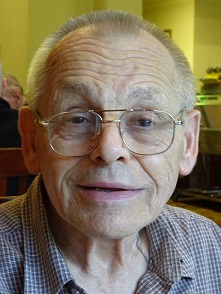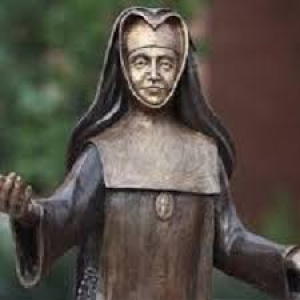Peter MALONE
Baby Ruby
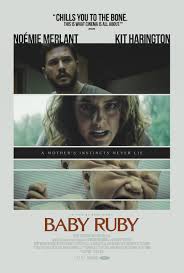
BABY RUBY
US, 2022, 93 minutes, Colour.
Noemie Merlant, Kit Harrington, Jayne Atkinson, Reed Birney.
Directed by Bess Wohl.
Baby Ruby sounds very nice as a title for a film. However, this is a serious film, touches of anxiety, depression, psychosis.
While the setting is the United States, the leading actors come from outside the US, Noemi Merlant is French and this is referred to, while Kit Harrington, famous for Game of Thrones) is British. He is a butcher in a small American town. She is pregnant, an Influencer with her posts and articles online, with quite a following, especially in the town. At the opening of the film, she is preparing a baby shower for herself and the child to be born.
Response to the film will depend on perspectives and experience. There is the male experience, the experience of fathers. There is the female experience, of pregnancy, giving birth, of post-partum anxiety.
After the birth, Jo finds the continued crying of the baby most stressful. However, over the time, tending the baby, feeding it, getting exasperated, going to the doctor who reassures them that there is nothing wrong with the baby, she becomes more and more depressed, more anxious, some quite erratic behaviour, even sexually, with a neighbour, her husband puzzled, her seeing suspicious aspects everywhere, and the presence and comments from her mother-in-law.
The mother has some hallucinations – and some wondering whether the whole film is something of a hallucination.
The film is a portrait of a mother becoming more and more desperate, a nice husband and his inability to help, a mother-in-law his who is both interfering and supportive.
- The title, a film about mothers and babies, pregnancy, expectations, birth, post-partum anxieties, psychosis?
- The American town, ordinary, the butcher, the influence and her friends, testing, doctors, ordinary life, sinister aspects of ordinary life? The musical score?
- The focus on Jo, French background, in the US, married to Spencer, online, her posts, influence, admired? Spencer, ordinary, the butcher, love for his wife? His mother and her presence, dominating, helpful, critical?
- The pregnancy, the preparation for the Baby shower, the women arriving, the happy situation? The beginnings of Jo and her apprehensions? The birth?
- The consequences for Jo, love for the baby, calling her Ruby? Spencer and his devotion? The friends wanting posts about the baby, Jo not putting them online?
- Audience identification with Jo, women’s perspective, man’s perspective, mothers, fathers, grandparents? Empathy with Jo and her tensions? And the baby crying?
- The effect on Jo, the continued crying, her anxieties, depression, behaviour? Yet her love for the baby, the books, the visit to the doctor, nothing wrong with the baby, his seeming criticism, her reading, thinking that the baby was trying to communicate with her?
- The consequences at home, Spencer and his devotion, trying to help, at work? The baby crying, the nights, during the day, outings? Time passing?
- Doris, her presence, her comments, criticisms, support? Her story about Spencer as a baby and the difficulties?
- The ominous aspects, the memory of the woman approaching Jo at the store, not allowing her to remove the cover to disturb the baby? Her being part of the group? The later encounter is, in the street?
- Jo, more anxious, wanting to go out, the party, her drinking, the sexual encounter, as a dream or reality, the aftermath and the woman explaining the experience? Sinister suggestions and suspicions, the meat from the butchers…?
- The cumulative effect on Jo, medication, institution, becoming calm, coming home again, the baby crying, the baby giving a message?
- The buildup to the ending, ominous, and the tension for the audience, whatever their experience of babies, for anxiety for mother and child?
Deadpool & Wolverine
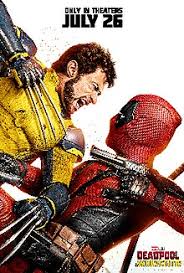
DEADPOOL & WOLVERINE
US, 2024, 128 minutes, Colour.
Ryan Reynolds, Hugh Jackman, Emma Corrin, Matthew McFadyen, Jon Favreau, Marina Baccarin, Rob Delaney, Leslie Uggams, Jennifer Garner, Wesley Snipes, Channing Tatum, Chris Evans, Henry Cavill, Tyler Mane, Blake Lively, Nathan Fillion, Matthew McConnaughey.
Directed by Shawn Levy.
Probably best to say at the outset, Deadpool & Wolverine is beyond review. Within two weeks of its opening around the world, its box office is almost $1 billion. Which means that worldwide, it has been instantly seen by millions. With much more to follow.
It does raise an interesting 2024 question concerning the two films which have been most successful, Inside Out 2 and Deadpool and Wolverine. What they have in common is the animation/cartoon style. And they appeal to a wide audience. However, Inside Out 2 is appealing to deeper human feelings, to sensitivity and empathy. Deadpool & Wolverine is appealing to an emotional bonanza, excitement extravaganza, no holds barred, limitless imagination, potential cosmic destruction, violent visual conflict between good and evil, and superheroes to the rescue. And, not exactly modestly, Deadpool considers himself as a world saviour, a ‘Marvel Jesus’, booking his place in future Christ-figure studies.
There were a lot of writers for this film, including Ryan Reynolds, and it is full of disposable, throwaway quips, some of them very funny, references to the ups and downs of the Marvel film franchise, Disney, a collapsed Fox logo, to Hugh Jackman and his divorce, but there for the attentive satirical ear.
And the film presupposes favourable response to Deadpool in the Ryan Reynolds style (and a later Reynolds variation appears, over nice with the pet dog, Dogpool). Wade Wilson with his mixed history and burnt face, is eager to be in Avengers story, but put on hold. However, as always with American films, there is a bureaucratic British villain, Matthew McFadyen (now widely-known because of his presence in Succession). There is a bureau for saving timelines, there is a threat to the universe, Deadpool is there to combat but the only person he wants to work with is Wolverine. (And a bevy of jokes about a range of alternate Wolverines, visualised comically, all Hugh Jackman-aggressive). Probably this is the moment in a review to mention what one might call hyper-frequent coarse language.
There are also constant references to the previous Deadpool films as well as to the many X-Men films which fans will enjoy (and quite some entertaining references during the final credits). A surprise for the early viewers of the film but now everybody knows, a lot of cameos from previous superheroes like Wesley Snipes as Blade, Jennifer Garner as Electra, and especially Chris Evans as Captain America and a French-accented Channing Tatum. Even Ryan Reynolds’ wife, Blake Lively, appears as Lady Deadpool!
While it is acknowledged with specific reference to Furiosa, a large part of the early film is an extravagant variation on the Mad Max movies. Then we discover a new villain, Cassandra (Emma Corrin), a bald half sister of Patrick Stewart’s Charles (though he and, up till now, we, never knew about her). And she has super destructive powers. Which leads to quite a lot of mayhem, extravagantly high body count, the confrontation with a legion of Deadpool variations and their slaughter – but the power of regeneration and the possibility of it all over again.
So, it looks as though this is the entertainment to cheer worldwide audiences in the Groupe of so many war tensions, civil wars and invasions, terrorism of 2024. As they say, the audiences have been lapping it up – but, those with more restrained sensibilities, might find it more than they can gulp or swallow.
Special award for living with diabetes, Henk Bosman MSC, 80 yeara
Special award for living with diabetes, Henk Bosman MSC, 80 years

On Wednesday 17th July 2024 the Governor of NSW , her Excellency Margaret Beazley AC KC, presented Kellion Victory medals to some 20 people who are insulin dependent for more than 50 years. Most were accompanied by their carers.
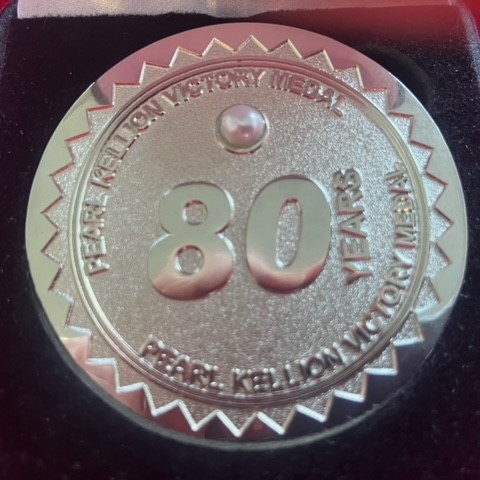
A short unexpected stay in hospital prevented Henk from attending the ceremony in person. His brother John received the medal on Henk's behalf.
At the NSW ceremony 6 participants received the 50 years award, eleven the 60, one the 70 years award and two the 80 years one.

The Governor and the Diabetics Australia CEO gave inspiring addresses.
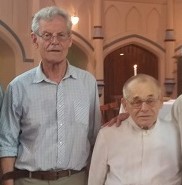
Henk and John on the occasion of Henk's Golden Jubilee of profession, 2019
The ceremony was impressive, yet informal; held on a beautiful, cold but sunny day at Government House in Sydney.
Some Significant Days for the Chevalier Family, August, 2024
Some Significant Days for the Chevalier Family, August, 2024
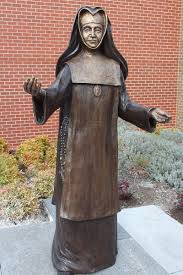
See August 1st, 14th, 27th, 30th, Mother Marie Louise Hartzer and OLSH missionaries
1 August, 1879
The Italian Annals of OLSH are from now on published in Rome instead of Osimo, Italy.
1 August, 1887
The first four FDNSC Sisters arrive at Yule Island, PNG
1 August, 1967
The Irish MSC and their first project in Venezuelan, the parish of Our Lady of Coronato in Maracaibo
3 August, 1899
First community of MSC Sisters is established in Hiltrup, Germany: two Sisters of Divine Providence and one MSC candidate. Sister Servatia, one of the Divine Providence Sisters, is appointed first Superior General of the MSC Sisters, Hiltrup.
3 August, 1950
Fr L. Koppert MSC dies in Rome. He had been in charge of the International MSC Scholastic that since 1924.
4 August, 1859
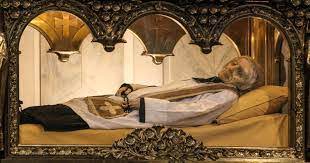
The saintly Curé d'Ars, Jean-Marie Vianney, dies, shortly after the visit of Father Chevalier on 14 July, 1859.
5 August, 1951
Inauguration of the new parish of Our Lady of Fatima in Buenos Aires, Argentina.
5 August, 1982
MSC Sisters open a Novitiate in Bangalore, India.
6 August, 1930
Fr John Doyle MSC, Australia, arrives in Sideia/Samarai, Eastern Papua. He will later become the first Bishop of Sideia
6 August, 1986
The Canonical Erection of the UAF (Union of French-speaking Africa) on June 18 becomes effective. Father Karl Hofer is the first superior.
6 August, 1988
St Pauls National seminary for Late Vocations, founded at Kensington in 1968, has its 200th ordination to the priesthood.
8 August, 1909
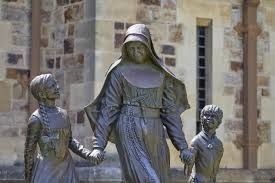
Death of St Mary MacKillop Australia’s first saint – one of the priests who anointed her was Fr Matthew Smith MSC (and a plaque commemorating this in OLSH parish church, Randwick).
10 August, 1928
Fr Karl Laufer MSC, German province, is ordained a priest at Paderborn. He gained fame as missionary and anthropologist in New Britain, PNG.
11 August, 1905
MSC General Chapter at Louvain, in Belgium. Decisions taken were: to revise the Constitutions of Father Founder, to move the Generalate to Rome, and to drop the \'fourth\' vow. This \'Vow of Stability\' could be taken by individual members to stay in the congregation until death, and also included being willing to be sent on mission anywhere in the world by the Pope or religious superior.
11 August, 1908.
Arrival of the first eight MSC sisters from Germany in the US.
12 August, 1855
After a retreat in a Trappist monastery, Father Charles Piperon decides “to live and die as a religious”.
13 August, 1890
Blessing of the new MSC House in Tilburg, Holland.
13 August, 1904
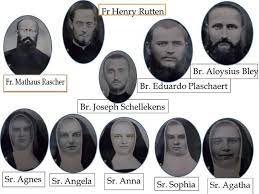
The Baining Martyrs: Father M. Rascher, together with three MSC confreres, a Trappist Brother, five MSC Sisters and seven Catholic Bainings, are killed in the Baining Mountains, East New Britain, PNG.
14 August, 1895
Arrival of the first FDNSC in Nonouti, Gilbert Islands (Kiribati).
14 August, 1905
Foundation of the mission station at Merauke, Irian Jaya, Indonesia.
14 August, 1981
The first MSC novitiate of the South African Region, entrusted to the Irish province, opened in Ofcolaco with three novices.
15 August, 1905
Fr E.Meyer is elected superior general (1905-1920).
15 August, 1919
Erection of the Dutch MSC province.
15 August, 1946
Arrival of the first nine Italian MSC in Pinheiro, Brazil.
15 August, 1945
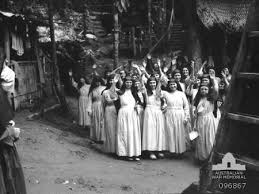
MSC Sisters in PNG are released from Ramale Camp, New Britain.
16 August, 1869
The Archbishop of Bourges blesses the MSC novitiate at Montlucon, a distance of five minutes from the church of St Paul where Father Guyot, the first novice Master, his parish priest.
18 August, 1920
Father Adrian Brocken, Holland, is elected Period General (1920-1932)
19 August, 1923
Archbishop Louis Coupe, Vicar Apostolic of Rabaul from 1890-1923, retires.
couppe
20 August, 1848
This date remembers the death of Jean-Charles Chevalier, the father of Jules Chevalier.
20 August, 1926
Fr Bernardus Weidenbrugge, one of the 14 Trappist who joined the MSC in Belgian Congo, Zaire, in 1926, makes his first profession.
21 August, 1882
Fr Andre Navarre and his two companions arrive in Sydney on the way to the mission of Melanesia. They are welcomed by the Marist Fathers. A week later they are able to leave for Port Breton with a ship of the Marquis de Ray.
21 August, 1988
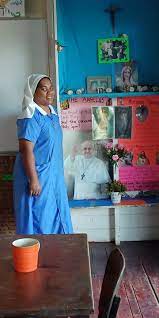
Three Kiribati Daughters of Our Lady of the Sacred Heart leave from Majuro, the first foundation in the Marshall Islands.
22 August, 1985
Two MSC sisters of the Peruvian Province depart for the Dominican Republic to start a new mission
24 August, 1863
In the presence of the notary public, Brinet, an act is signed by M, de Champgrand stating that Fr Jules Chevalier has obtained possession of the whole property at its centre.
24 August, 1946
Fr Andre Sorin MSC consecrated in OLSH church Randwick as the Vicar Apostolic of Moresby.
25 August, 1905
Erection of the French province.
25 August, 1985
Fathers Arguillas and Ceniza, Philippines, take possession of the first MSC house in Seoul, Korea.
26 August, 1902
Erection of the first MSC house in Switzerland, at pre-Borg
27 August, 1837
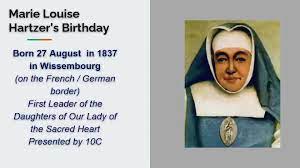
This date recalls the birth of Marie-Louise Mestmann (Hartzer) in Wissembourg, France.
hartzer
28 August, 1901
Fr Chevalier asks Rome to accept his resignation as Superior General and to grant him a decree of “secularisation pro forma” for as long as the situation demands. Both requests were granted.
29 August, 1920
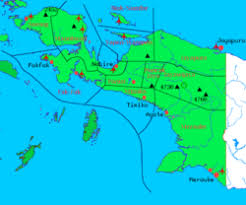
The Apostolic Prefecture of Dutch New Guinea, Irian Jaya, Indonesia, becomes an Apostolic Vicariate.
29 August, 1965,
Fr Cadoux MSC, France, appointed Bishop of Koalack, Senegal, ordained at Issoudun.
30 August, 1874 - 2024, 150th Anniversary
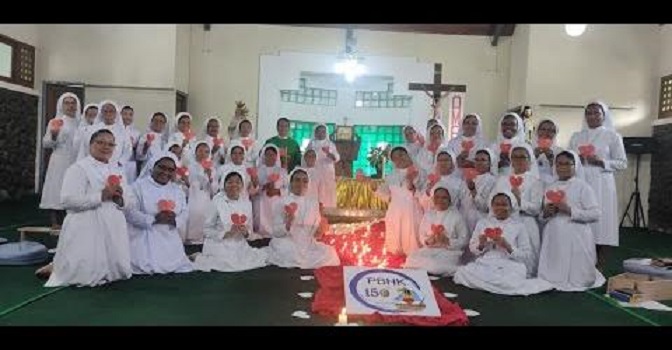
Foundation of the Daughters of Our Lady of the Sacred Heart by Father Chevalier in Issoudun, as a Sister Congregation to the Missionaries of the Sacred Heart.
30 August, 1948
Arrival in Argentina of the first two MSC fathers, Chelsea Megiddo and Bonito Camino, Spain.
30 August, 1983
The Congregation for Religious approves the updated version of the Constitutions of the FDNSC – Constitutions originally drawn up by Fr Chevalier himself.
31 August, 1960

Erection of the Australian Province of the MSC Sisters.
I Love My Dad
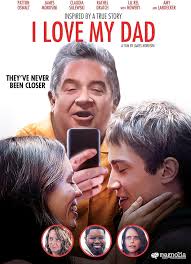
I LOVE MY DAD
US, 2022, 96 minutes, Colour.
Patton Oswalt, James Morosini, Claudia Sulewi, Lil Rel Howery, Rachel Dratch, Amy Landecker.
Directed by James Morosini.
I Love My Dad has been billed as a comedy. But it is a very black comedy, wry, making its audience uncomfortable.
Comedian Patton Oswalt is very effective as the father who has made excuses not to be a at events of his son’s growing up, is worried about his son now an adult, tries to reach out but fails, the son resenting him. He creates the situation of an online friendship, his pretending to be a young woman whom he has seen at a diner, sending her photo, phrasing his own outreach to his son through this waitress character.
The son has mental and emotional problems, resenting his father, lives with his mother, goes to group therapy. But he responds very well to the outreach from Becca, the waitress, the film showing his response, and using the device of having the waitress present in communications with the son, dancing in the street, conversations and advice, sexual encounter.
The father uses his sexual experience with his boss and getting her to phone the son. Later, she realises what she has done, reaches out to the mother who is very angry.
When the father decides to drive his son to meet the waitress, there is a dramatic episode in the diner and the eventual revelation of the truth.
However, there is some forgiveness at the end – and the son himself using the device to get his father to come to live near him and his mother.
The film was written and directed by James Morosini who says that the interaction between father and son is based on his own experience.
- Based on the experience of the writer-director? Serious, comic?
- The emotional response of the audience, uncomfortable, identification with father, with son, with mother, with the boss, with Becca the waitress? Mixed emotions?
- The situation, as explained by the father, the bond with his son, all the excuses for not attending special events, the response of his son? The adult relationship? The father excusing himself, wanting to make amends?
- The situation of the son, mental health, self-destructive, relationship with his mother? Going to meetings, his glum contribution? His skills in design? Prospects? As a personality, audience identification with him, or not?
- The father and his plan, discussions with his friend, the reactions of his friend? Warnings? The father and the diner, seeing Becca? The picture? Setting up the situation on the Internet, contacting his son, the son’s response, the continued correspondence, the father and his outreach? Good sense, common sense, mistakes? His relationship with his boss, persuading her to participate? His own sexual experiences, into the texting?
- The son and his response, enthusing, the correspondence, the device of having Becca present, dancing in the street, the sexual encounter, the conversations, friendship? His complete involvement? His mother’s reaction?
- The father, the complications of the situation, his son wanting to meet Becca, the father driving all the way? The discussions, the devices of the continuing texting, the effect on the son, the father and his dilemmas, at the motel, in the car?
- The boss, her contacting the mother, the mother and her anger, her threats to the father?
- The episode in the diner, the real Becca, the son and his advances and behaviour, the father in the kitchen, keeping the busboy away, the eventual explosion? The father and his confession? The son’s reaction?
- The son, still loving his father, despite the situation? His job and the references from Becca? And his sending his father the letter about the vacant apartment opposite the house, the father’s rival, the mother’s reaction, the realisation of what it happened?
Miller's Girl
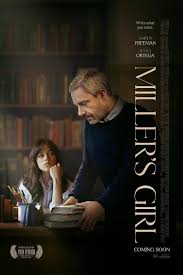
MILLER'S GIRL
US, 2024, 96 minutes, Colour.
Martin Freeman, Jenna Ortega, Bashir Salahuddin, Gideon Adlon, Dagmara Dominczyk.
Directed by Jade Halley Bartlett.
This is not a film for the wide audience. It takes a very serious subject, teacher-student relationships. However, the screenplay is filled with excerpts from literature, especially from Henry Miller, his sexual subjects and style, actually not permitted to be taught in the school in the film. There are many other literary references and literary discussions which may be too much for the wider audience.
British actor, Martin Freeman (The Hobbit, Dr Watson to Benedict Cumberbatch’s Sherlock Holmes) at a small American school, creative writing, himself a published author of short stories, resigned to being a teacher rather than success as a writer. He has a brittle marriage with his wife, preoccupied with her work, alcoholic.
Rising star Jenna Ortega (Wednesday, Scream) is a wealthy 18-year-old living in a mansion while her parents travel abroad. She is well read and has ambitions. In her encounter with her teacher, she reveals her talents, he is intrigued, becomes infatuated and affected by her, she controlling the situation, writing a story based on Henry Miller which has quite a psychological sexual effect on her teacher.
Feeling some rejection and the criticism of her story, she reports him to the school’s principal, leading to questioning, suspension, and her being vindictive, even to her close friend at school.
Another variation on the dangers of teacher-student relationships and involvement.
- The name, Miller? The character, the novelist Henry Miller, his books, his themes, sexuality, relationships, obsessions?
- The American town, remote, school, classes, lecturers, the principal? Other students? The literature class, the students, the reading, the assignments, their stories? Jonathan Miller, leading the class? The friendship with Boris and his presence?
- Martin Freeman as Jonathan Miller, middle-aged, the writer, his ambitions, disappointments, the tension in his marriage, his wife drinking, her work, his resentments? Love of literature, option to teach, the encounter with Cairo, that she had read Finnegan’s Wake, his admiration, comments to Boris? His interest in her, her living alone, coming through the woods, the discussions, the assignment, her story, Henry Miller and his not being allowed to be taught at the school, the continued meetings, the effect on Miller, the effect on Cairo, teacher-student relationship?
- Cairo, the story about her parents, living in the mansion, alone, through the woods, her friendship with Winnie, Winnie and her blasé attitudes, seductive towards Boris, the discussions about sex and sexuality, about her relationship with Miller, the writing of the story, the sexual encounter with each and her later using it to intimidate Winnie? Her background, wanting to be a writer, her extensive reading?
- The teacher-student relationship, the shared discussions, very literary, the meetings, outside, smoking, Boris present, the phone call, calling in at her house in the evening?
- Boris, friend, teacher, sounding board for Jonathan? With Winnie?
- Jonathan, the infatuation, her work, the sexual effect on him? His wife’s interrogation? The consequence of his trying to be detached?
- The effect on Cairo, her reporting into the principal, his being called in, the discussions, his defence, her insistence? The effect on him?
- At home, the taunting of his wife, interrogation? His loneliness, suspended? Cairo’s victim?
- Cairo, vindictive, seductive, and the collapse of her friendship with Winnie?
- The literary nature of the screenplay, limiting the potential audience not familiar with literature or interested in hearing lengthy excerpts and discussions?
- A variation on seduction and the teacher-student relationship?
Ka Whawhai Tonu, Struggle without End
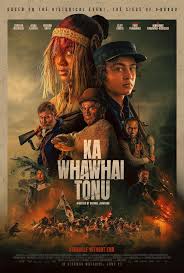
KA WHAWHAI TONU - STRUGGLE WITHOUT END
New Zealand, 2024, 115 minutes, Colour.
Temuera Morrison, Paku Fernandez, Hinerangi Harawira-Nicholas, Jason Flemyng, Ariana Smith, Te Wakaunua Te Kurapa, Cliff Curtis, Jack Barry.
Directed by Mike Jonathan.
The middle of 2024 was a significant time for the release of significant New Zealand films, significant films with Maori themes. Firstly, Lee Tamahori completed his trilogy which began with Once Were Warriors in 1994, and his going back to the 1930s, the tribal warfare, the establishment of colonial towns, conflicts, The Convert. Soon after came the contemporary story The Mountain, directed by Rachel House, symbol of Mount Taranaki and three 11-year-olds wanting to climb it, opening up themes of Maori lore. And now this film with its Maori title, boldly asserting Maori language and presence, and an English subtitle, Struggle Without End.
The action of this film moves thirty years on from the 1830s of The Convert. This is a time of rebellion, a gathering of tribes, a rebellion, the taking of a stand at a fort, the attack of the British colonial soldiers, the onslaught, a subjugation.
Again, as with The Convert, the cinematography of the New Zealand landscapes is beautiful and significant. As is the musical score.
The context of the narrative is the gathering of the tribal leaders, discussions about war, possibilities for peace, the significant leader, Rewi (played by Temuera Morrison 30 years after his significant role in Once Were Warriors) is fierce, traditional beliefs, but acceptance of Christian faith (and a cameo from Cliff Curtis as a priest, Curtis also being a star of Once Were Warriors), wanting the possibilities for peace. However, there are other fierce Warriors who want action, bloodshed.
This is the framework for a central narrative which focuses on a teenage lad, Jack (an effective performance from Paku Fernandez), Maori mother, White soldier father (Jason Flemyng) who is captured, bound and gagged, telling a story of simply wanting to visit his grandmother. Also in the camp is a young woman who is considered to have special powers, contact with the gods, visions. She is Kapu, manipulated by her ambitious mother, set in a kind of shrine, special garb and head coverings, having some mystical experiences and visions, but also young and lonely.
Most of the language of the film is Maori but, just as we might be thinking of Romeo and Juliet, a moment of English-language actually refers to “star-crossed lovers”. So, with the expected sequences, brutal as they are, of the British soldiers’ advance, of the fort defence, of massacre, there is also the story of Jack, at first skilfully helping with making the bullets, but then an escape with some of the younger people from the Fort.
But, there are moral dilemmas for Jack, rejoining his military father, memories of his own service and some of the brutality he had to participate in, at a crossroads in his life, the impact of his British military upbringing, his love for his mother and sadness at her death, and an option for following his Maori heritage.
In many ways, the colonial-Maori clash is as expected, but is enhanced by the personal, young story at its core. And, at the end, there is information about the decline in the Maori population during the 19th century, but also about the changes and developments in place for Maori peoples at the end of the century into the present.
- The title, the Maori language, Maori-assertion, history? For the Maori audience, for the wide New Zealand audience, beyond New Zealand?
- Audience knowledge of colonisation in the 19th century? The British, the towns, the impact on the Maori peoples, tribal warfare, Treaty of Waitangi, the uprisings and rebellions, the massacres, the 19th century history, the beginning of the increase of the Maori population, rights, place in New Zealand society?
- The 1860s, Britain as a colonial power, the soldiers, the forts, weapons, rifles and muskets, uniforms, distinctive? Recruiting among the Maoris? Intermarriages and children? The film’s focus on the uprising, the oncoming British forces, the shooting and deaths? The final colonial victory? The consequences?
- The gathering of the Maori warriors, Rewi and his leadership, status, personality, the Maori markings, his language, yet his wanting peace, the Christian traditions, his relationship with the priest, the singing of hymns? In the tradition of the gods, the regional and tribal gods, mystic communications?
- The other warriors, their fierceness, wanting war, taking of Jack, wanting him to be a sacrifice, the fierceness of the warriors, but their possessing the weapons, readiness to fight?
- The place of Kopu? Her age, set aside by her mother, her mother’s ambitions, as channelling the gods and power? Her adornments, alone? The trances and visions? Yet her not wanting this position, rebelling against her mother? Her mother’s aggressive power? Her mother later with the soldiers?
- Jack, the gradual revealing of his background, his Maori mother and grandmother, his father a soldier, Jack and the army, his being captured, truth and lies, saying he was going to see his grandmother, his being bound and gagged, speaking to Kopu, engaging her sympathy, sharing his loneliness? With the warriors, those wanting him to be sacrificed, those for keeping the peace?
- The younger members of the Maori group, boys and girls, their status? The baby? And the role of the older women?
- Under siege, the making of the bullets, Jack and his skills, working? His attempts at escape? Being returned?
- The advance of the British, the role of Jack’s father, seeing him in the flashbacks, in command, ruthless? The advance, shooting, the many deaths? The remnant?
- Kopu, interactions with Jack, his offering to help her escape, with the young children, the escape, through the bush, hiding, the pursuit of the soldiers? The young boy wounded, their carrying him? The vision of the town where Jack came from? The song? The findings, all the dead? Another town, the different letter in spelling?
- Jack, leaving the group, going back, his father finding him, his salute, his role with the Army, memories of his mother in the flashbacks, his conscience, his father commanding him, especially the people in the hunt, his setting fire, his father getting him to shoot the victim? His father’s love for him, his sternness? Jack, making decisions, the escape?
- Jack with the horses, rejoining the young ones, the death of the boy? The arrival of Jack’s father, the confrontation? The arrival of the warrior? their fight, the sword, the cudgel, the deadly fight? The death of Jack’s father?
- The consequences, Jack and his future, his options, with Kopu and the children?
- The consequent information about the putting down of the Maori peoples, gradually increasing in number, during the 20th century, to the present day?
Sleeping Dogs/ 2024
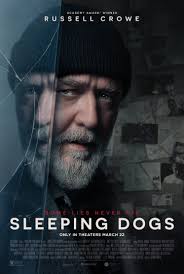
SLEEPING DOGS
Australia/US, 2024, 110 minutes, Colour.
Russell Crowe, Karen Gillan, Marton Csokas, Tommy Flanagan, Thomas M.Wright, Harry Greenwood, Pacharo Mzembe, Lynn Gilmartin.
Directed by Adam Cooper.
The metaphor of the title indicates that sometimes it may be better to leave past events as they are because we do not know what revelations will appear if the past is stirred. And that happens here -in an interesting and evocative way.
This is a very American story, the police, death row and executions, investigating cold cases, psychology and experimentation, drugs to suppress PTSD memories, experiments to reactivate memory. However, Sleeping Dogs was, in fact, made in Australia, with a mainly Australian cast with New Zealand’s Marton Csokas, Karen Gillan and Tommy Flanagan from Scotland – no American in the cast. (Of interest, Harry Greenwood is the son of Hugo Weaving; Thomas M. Wright was a writer-director of the award-winning drama, The Stranger, 2022).
But it stars Russell Crowe in a very interesting performance as a former police officer of 20 years, Roy Freeman, involved in a drink-driving accident, damage to his skull and brain, now undergoing a particular therapy to try to reactivate his memory, to redirect the neural paths of his brain. We see him at home, notes everywhere around his apartment indicating how he is to act, his name, preparing a meal… We see him undergoing his treatment and moments when memory begins to return.
However, the key to the drama is a prisoner coming to appeal to Roy to reopen his case because he is about to be executed and professes his innocence, Roy thinking that this was an expected ploy. However, something alerts him and he begins to investigate.
Which, clearly, is the point where a reviewer has to go no further with the narrative. Rather, there can be a whetting of the audience appetite to indicate who the central characters are. Marton Csokas’s appears as Dr Wieder, a very talented psychologist who is working on the program for suppressing PTSD memories. Karen Gillan is his equally talented associate in the research. There is the enigmatic writer, played by Harry Greenwood. At his home, there is an Iraq war veteran, played by Thomas M. Wright, doing repair jobs.
Tommy Flanagan plays Roy’s former partner approached by Roy to help him pursue the case. And the case is the murder of Dr Wieder in his home – and, all of the above characters, involved each in their own way.
So, a different kind of police investigation, unearthing different clues, some plot twists, and, depending on how many films one has seen, an expected or unexpected ending!
- The metaphor of the title, leaving past events lie unless, when roused, there is greater trouble?
- An American setting, the police and investigations, psychology and medicine, prison, death penalty?
- But the film made in Australia, locations for the US, the cast, Australian, New Zealand, Scotland? No American cast?
- The atmosphere of the American city, homes and apartments, the streets, police precincts, universities, lecture rooms, laboratories? The musical score?
- The situation, Roy Freeman, a Russell Crowe performance, his situation, the drunk driving accident, his injuries, skull and to the brain, his undergoing experimental therapy, to retrain the neural paths, to regain memory? Seeing him in his apartment, all the notes around the room to indicate who he was, meals, refrigerator, domestic details?
- The visit of the condemned criminal, Roy not remembering him, the man about to die on death row, his plea for Roy to help him, proclaiming his innocence, that there was someone in the house when he went to confront Dr Wieder who had testified against him? Roy not believing him, thinking it was a usual plea to prevent his execution?
- The structure of the film, the action in the present, Roy and his investigations, his continued treatment, beginning to remember some details, his pursuit of the case, looking at the records, getting the documents on the case? The signature of Jimmy Remis?
- His going to see Jimmy again, Jimmy off the force, in decline, the death of his wife, the memories of the case, his reluctant agreement to help Roy?
- The filling of the background of Dr Wieder, his experiments to help people six our past memories (and the contrast with Roy’s treatment to recover memories)? His work with the Laura, her academic collaboration, the relationship? Dr Wieder and his personality? His helping Wayne Devereaux, his background in Iraq, PTSD, working for Dr Wieder?
- The film following through on the characters connected with Dr Wieder, Laura and her disappearance, Roy finding her again, memories of having met her in the past, the new identity, her book, the reviews, the issue of the credit for the work with Dr Wieder, the flashback to her visiting the authorities after his death and claiming authorship, and Roy later visiting the authority and interviewing her and getting her perspective?
- Wayne Devereaux and his disappearance, finding him again, his explanations, the phone call, in the truck, trying to knock down Roy, Roy and his gun, shooting, the identification of Devereaux, the mystery of his attempt to kill Roy, Roy and the police interviews?
- Laura as Elizabeth, her meeting with Roy, taunting him, the gradual revelations about her, her seeming to be a suspect, the plausibility, yet her alibi, her being the house, leaving?
- Mystery of Richard Finn, his connection with Dr Wieder, the encounter with Laura, her advance, the relationship, tensions, her disappearance, we are going to see Richard’s widow, the impact of his death? The connections? Roy at the funeral, his brother, the manuscript, the dramatising of the manuscript, his story, especially about Laura and Dr Wieder, Roy giving it to Laura, her denying its truth? Richard and his ambitions as a storyteller, creating the story and memories of a life? (Contrasting with Dr Wieder of liberating, Roy’s therapist resurrecting?)
- The visualising of the murder suspect, drugged, hiding, being present at the death?
- The complications with Jimmy, his being the only signature on the documents whereas Roy always co-signed, gradual revelations about Jimmy, the contact with Laura, the money issues, her confronting Dr Wieder?
- The gradual revelation of why Roy did not sign the documents, Jimmy’s role and support, but Roy in his seeking out, turning against Jimmy? Jim’s death? Laura?
- The memory coming back, this discovery of himself, the issue of his wife at the diner, her death, the photo with his wife and the smashed glass over her face, his removing it, the final truth and the brutal visualisation of the murder? And the meaning of the title?
No Negociable/ Not Negotiable
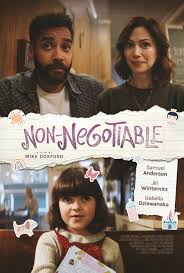
NOT NEGOTIABLE/ NO NEGOCIABLE
Mexico, 2024, 87 minutes, Colour.
Mauricio Ochmann, Tato Alexander, Geraldine Zonat, Fernanda Borches, Enoc Leano, Leonardo Ortizgris.
Directed by Juan Taratuto.
While the film opens with something of a light touch, even in a hostage mediation scene, quickly mediated with success, and the mediator and his psychologist wife are sparring, observed by the young daughter, the possibility divorce, their going to couples therapy and arguing strongly, but six Negotiable has serious political themes.
We are introduced to a mysterious shopkeeper who fixes machines, is revealed, with an associate, to have a huge basement technological operation for surveillance. They then abduct the president who is on a tryst with a Congresswoman from the opposition. And the abductor wants the mediator to be the only person negotiating with him, even abducting his wife through her physical fitness coach.
The latter part of the film moves quite swiftly, the authorities, the mediator, the abductor and his demands, a lie detector and a charge whenever the president answers with false information.
And, there is a revelation of the back story of why the two men are in confrontation. So, time limits, expectations, action, a seeming resolution – and final revelation is about political corruption.
The film serves as something a rallying cry of what might happen to expose corrupt leaders.
- The title? Hostage situations, mediation? Negotiations, blocks?
- Mexican film, the setting, the city, the neighbourhoods, the initial abduction sequence, homes, therapy sessions, apartment blocks, hostages, surveillance headquarters? Atmosphere? The musical score?
- Alan Bender, introduction, with his wife and daughter, in the car, the squabbling, his going to mediation, smooth talking, appealing to the sentiment of the abductor, his dog…? At home, tensions at home, his promise not to be away all the time, not fulfilling it…? Love for his daughter? Arguments with his wife?
- The wife, psychiatrist, therapy, her client, the connection with the school, her daughter, her frustrations with her husband, the arguments of the therapy session? The fitness supervisor, the relationship?
- The introduction to Vicente, kindness towards the old lady, fixing her machine? Underground, the extensive technology, surveillance? His associate? The abduction of the president, in the car park, the guard in the boot of the car, president, his rendezvous, the Congresswoman? Their being tied up, Vicente and his mask on the screen? The motivation, the president and his way of life, the accusations, the buzzer and the charge for every lie?
- Vicente, the back story illustrated, sniper, with Alan, the shooting, the bus exploding, his being dismissed, prison, feeling that Alan had abandoned him? Abducting his wife?
- The government, the secretary of the interior, the revelation of her corruption, the hypothesis of what might happen, the risks to the President, the covering stories?
- The police, Alan and his stuttering assistant, Officer Socorro, her collaboration with Alan, his being warned off, his being singled out, his plans, the pizza and the lie detector, Vicente and his recording the president? The release of the hostages, the revelation that the fitness supervisor was the associate, brother of Vicente’s wife and her death, lack of funds, the money transfers?
- The final meeting, the plan for the release of the president, Vicente willing to go to jail, the video found on the associate, concealed with his wife, the expose, the commentary around the world, in the country, the demonstrations, the janitor hero – and the tongue in cheek ending with his wanting to be President
Semper Fi/ Brothers in Arms
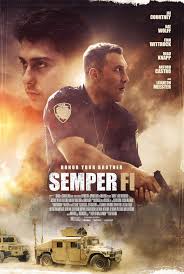
SEMPER FI/ BROTHERS IN ARMS
US, 2019, 99 minutes, Colour.
Jai Courtney, Nat Wolff, Finn Wittrock, Arturo Castro, Beau Knapp, Leighton Meester, Jared Bankens.
Directed by Henry Alex Rubin.
The title is the motto for the Marines. There is an alternative title focusing on the camaraderie between male friends and in war.
The setting is 2005, an ordinary American town, an introduction to a group of friends at a bowling alley, enjoying themselves, creating a bit of mischief with the owner, but carrying on their lives. Their leader is Callahan played by Australian Jai Courtney. He is older than the others, responsible for his half brother, Oyster, Nat Wolff. We see glimpses of the life of the other friends and their relationships, the visit to a bar, flirting, a fight in the toilets and the unintended death of a young man.
The group is also a reservist group and is called up to go to fight in Iraq – some scenes there, fighting, deaths, and Callahan in a confrontation with an arguing Iraqi and his shooting him – and the impact for the rest of the film in his not being charged in any way, returning home, resuming his way of life.
Oyster is arrested for the death of the young man in the toilet, resentful towards Callahan, going to jail, attacked by the guards in jail, drugs planted in his cell, put in solitary. When Callahan comes to visit he is surly and refuses to communicate with him.
The effect of the war, his rough past, getting his life in order, becoming part of the police force, the impact of the experiences in Iraq have upset Callahan and he determines, after the failed visits to Oyster, to free him from jail and get him across the Canadian border. He draws on the friends to collaborate in the plan, one supplying surveillance machine but reluctant to help because of his wife and child. Callahan also consults a friend who is against the war but is a lawyer, getting information and advice from her.
There is tension on the scene where the bus with the prisons is attacked, confrontation for Callahan, Oyster and his escape. Callahan finally having some satisfaction in doing something for someone else, especially Oyster, in his life.
- The original title? The motto of the Marines? The alternate title, military fraternity, relationships independence?
- 2005, setting, the town, streets, bowling alley, homes, the military, the fort? Scenes in Iraq, the desert, military action, dead and wounded? Prison? The musical score?
- The introduction to the brothers, their friendship, Callahan and his leadership, half-brother to Oyster, legal guardian, age and experience, the other friends, the episode at the bowling alley, competitiveness, friendship, the owner and his reaction, allowing them to play? The competitive running? The homes? At the bar, flirting with the girls? Oyster, wanting to buy the girls a drink, his rival, the fight in the toilets, the fatal injury to the man, his death?
- Callahan, older than the others, role in the police, the reservists, going to camp, the exercises, Oyster unsettled, the fight, the domestic work? The clashes with his brother? Independence? The girls, the fight, Callahan seeking him out, his plan to escape the country, with the help of Snowball? Callahan confronting him, handing him over?
- Oyster, his age, wilful, his book and plans to succeed, the arrest, his resentment, in prison, with the apples, the brutality of the guards, planting drugs, solitary? The visit by Callahan, his resistance? The buildup to the escape, Callahan’s speech about being substitute father, Oyster and his final response, crossing into Canada?
- The friends, bowling alley, competitiveness, girlfriends, military reserve, their going to Iraq, the scenes of action, Callahan and his confronting the man about the bed, the protests of the man, his shooting him? There all returning home? The action taken against Callahan? The effect on him – or not?
- The visits to Oyster, failure of communication, the decision to get him out, the discussions with the group, Jaeger and the loss of his leg, Milk collaborating, Snowball and his earnestness, Dwyer, his wife and child, opting out, giving the surveillance machine? Callahan, his determination, the discussions with Stacie, the past, her relationship with Jaeger, lawyer, against the war in Iraq, discussions about the penalty for abduction?
- The abduction, the car, the prisoners in the bus, Jaeger at first missing, the tire, the bus careering, the signals to Callahan, the confrontation of the guard, the guard able to ring through for support, Callahan’s boss and his trying to persuade Callahan to give up, the rescue of Oyster, taking him to the border, his getting through? Callahan, driving, the opposite direction, finally caught?
- The final moment, Callahan and what he did for Oyster, motivations, the law, responsibility, penalty, the future?

